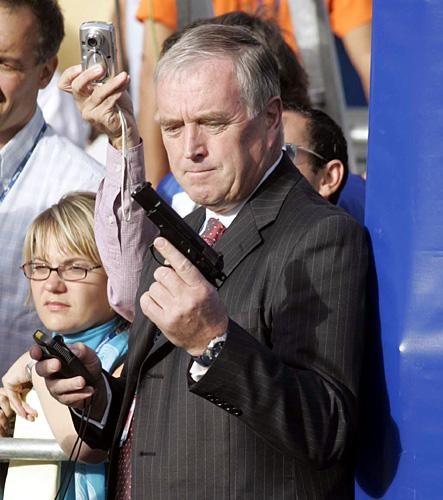Serious questions exist for biological passport
By Shane Stokes Following this week's decision that the eighteen ProTour teams would no longer be...

By Shane Stokes
Following this week's decision that the eighteen ProTour teams would no longer be part of the UCI's series from 2009 onwards, the governing body has asked the teams to decide before July 22nd if they wish to continue in the biological passport or not.
Considerable doubt exists about the future of the biological passport, not least because the UCI has dismissed the invitation from the teams and Grand Tour organisers to work with them on the new project.
The UCI describes this as unacceptable, saying that the proposed new system both undermines its role as a governing body and also gives too much power to ASO, a commercial organisation which the UCI says is primarily concerned with financial gain. The UCI alleges that what has happened is tantamount to blackmail on the part of the teams.
In a communication sent to those teams on Wednesday, the UCI states that if they decide to go their own way, that they will lose out in a number of areas. It says that it would no longer deal with issues such as registration procedures, management of bank guarantees, management of conflicts between teams and riders, providing commissaires and UCI disciplinary procedures.
"Without doubt, the quality of the organisation of your professional cycling will suffer, but that does not seem to give you concern," the communiqué warns.
"More complicated problems lie ahead for doping controls and the biological passport. If the UCI will no longer be your federation, it can not and should not do more anti-doping controls on the riders of your team, especially random checks.
Get The Leadout Newsletter
The latest race content, interviews, features, reviews and expert buying guides, direct to your inbox!
"Regarding the biological passport, the situation is unusual in that it is a project already underway. You understand that the UCI could not continue a project so complicated and expensive for teams that have pledged to leave in five months."
It says that the teams need to decide to what extent they continue in the biological passport for the remainder of 2008.
"In all cases, the UCI does not want the anti-doping battle to suffer from your decision and, with the consent of the riders, their values blood collected up to now may be transmitted to the [anti-doping] body that you indicate to us."
The communiqué then points out that the UCI is paying 660,000 euro per annum to run the biological passport, and that the expected contribution from the Grand Tour and the French ministry of 1 million euro has not been paid. It states that fees will be charged from August 1, and asks the teams to indicate by July 22nd at the latest if they agree to cover those costs plus the already-planned contribution of €120,000. If not, the biological passport for each team will be stopped.
"It is not logical that the UCI pays for a biological passport to be used by a dissident federation within the next few months," the communiqué states. It says that for any teams who decide they wish to continue with the UCI biological passport in 2009 and onwards, that a discussion of costs must be made.
In the letter, the UCI also argues that the proposed new system's guarantee of two year participation in the major events is less than the four years planned under the ProTour, and that this will impact on the ability to get sponsors.
"It means that teams can no longer sign contracts for four years, since they can no longer give guarantees beyond 2010."
The biological passport programme had started to come in doubt as early as June, when ASO announced the Tour de France would be governed by the French federation rather than by the UCI.
Cyclingnews plans to get feedback from team managers about these developments.